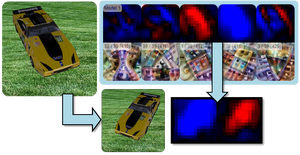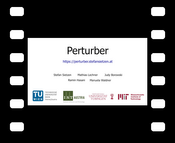Information
- Publication Type: Journal Paper with Conference Talk
- Workgroup(s)/Project(s):
- Date: October 2021
- Journal: Computer Graphics Forum
- Volume: 40
- Open Access: yes
- Lecturer: Stefan Sietzen
- Event: Pacific Graphics 2021
- DOI: 10.1111/cgf.14418
- Call for Papers: Call for Paper
- Pages: 12
- Publisher: John Wiley and Sons
- Conference date: 18. October 2021 – 21. October 2021
- Pages: 253 – 264
- Keywords: Computer Graphics and Computer-Aided Design
Abstract
While convolutional neural networks (CNNs) have found wide adoption as state-of-the-art models for image-related tasks, their predictions are often highly sensitive to small input perturbations, which the human vision is robust against. This paper presents Perturber, a web-based application that allows users to instantaneously explore how CNN activations and predictions evolve when a 3D input scene is interactively perturbed. Perturber offers a large variety of scene modifications, such as camera controls, lighting and shading effects, background modifications, object morphing, as well as adversarial attacks, to facilitate the discovery of potential vulnerabilities. Fine-tuned model versions can be directly compared for qualitative evaluation of their robustness. Case studies with machine learning experts have shown that Perturber helps users to quickly generate hypotheses about model vulnerabilities and to qualitatively compare model behavior. Using quantitative analyses, we could replicate users' insights with other CNN architectures and input images, yielding new insights about the vulnerability of adversarially trained models.Additional Files and Images
Additional images and videos
 teaser:
Activations and feature visualizations for neurons associated with complex shapes and curvatures in layer mixed4a in the standard model. Note how rotating the input model causes activation changes for oriented shape detectors.
teaser:
Activations and feature visualizations for neurons associated with complex shapes and curvatures in layer mixed4a in the standard model. Note how rotating the input model causes activation changes for oriented shape detectors.
Additional files
 supplementary document :
Additional use cases and detailed reports from the case study
supplementary document :
Additional use cases and detailed reports from the case study
Weblinks
- online tool
Perturber online tool for interactive analysis of CNN robustness - Entry in reposiTUm (TU Wien Publication Database)
- DOI: 10.1111/cgf.14418
BibTeX
@article{sietzen-2021-perturber,
title = "Interactive Analysis of CNN Robustness",
author = "Stefan Sietzen and Mathias Lechner and Judy Borowski and
Ramin Hasani and Manuela Waldner",
year = "2021",
abstract = "While convolutional neural networks (CNNs) have found wide
adoption as state-of-the-art models for image-related tasks,
their predictions are often highly sensitive to small input
perturbations, which the human vision is robust against.
This paper presents Perturber, a web-based application that
allows users to instantaneously explore how CNN activations
and predictions evolve when a 3D input scene is
interactively perturbed. Perturber offers a large variety of
scene modifications, such as camera controls, lighting and
shading effects, background modifications, object morphing,
as well as adversarial attacks, to facilitate the discovery
of potential vulnerabilities. Fine-tuned model versions can
be directly compared for qualitative evaluation of their
robustness. Case studies with machine learning experts have
shown that Perturber helps users to quickly generate
hypotheses about model vulnerabilities and to qualitatively
compare model behavior. Using quantitative analyses, we
could replicate users' insights with other CNN architectures
and input images, yielding new insights about the
vulnerability of adversarially trained models. ",
month = oct,
journal = "Computer Graphics Forum",
volume = "40",
doi = "10.1111/cgf.14418",
pages = "12",
publisher = "John Wiley and Sons",
pages = "253--264",
keywords = "Computer Graphics and Computer-Aided Design",
URL = "https://www.cg.tuwien.ac.at/research/publications/2021/sietzen-2021-perturber/",
}


 paper
paper video
video
